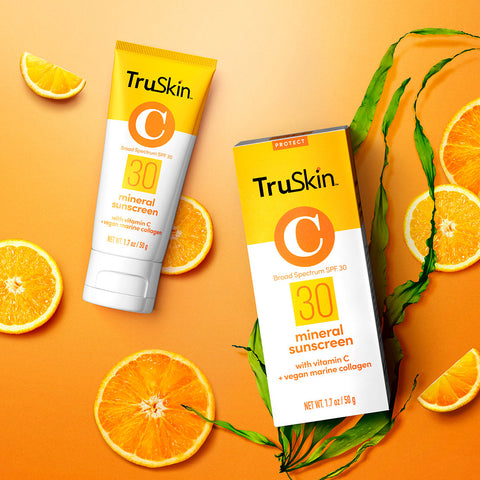
5 Must-Do Habits For Slowing Down Collagen Loss
Read on for five of the most important skincare habits for preventing collagen loss.
Fact of the day: skin is nothing without collagen. It’s the most abundant protein in the entire human body and accounts for somewhere between 80 and 90 percent of all proteins found in your skin.
It is not to be taken for granted.
As far as your skin goes, collagen is what gives it strength, structure and support. It kind of holds everything together like a clever network of protein-based scaffolding. It’s really good stuff. Like, REALLY good.
One major problem, however: while super abundant during your younger years – hence that plump, firm skin you might just about remember – collagen production dramatically drops as you get older. This is all thanks to your natural aging process as well everything else the world throws at you – stress, the sun, environmental pollution and a cruddy diet to name just a few. And while you can’t stop or reverse time, all these other lifestyle factors are very much in your control.
On that note, below are five of the most important ways to help preserve your levels of collagen as much as possible. It’s time to take charge, people!
1. Be 100% Sun Smart
No matter how many times we stress the importance of sun protection there are still people out there who don’t apply daily sunscreen to shield their skin from the damaging ways of the sun.
Bonkers.
After the ticking clocks of time, the sun is the number one cause of aging skin. In fact, UVA rays, in particular, penetrate deep into the dermis of your skin where they really do a number on your collagen. According to the Skin Cancer Foundation, damage from UV light results in over 80 percent of all your lines, wrinkles, textural issues and dark spots. Ouch!
The good news, however, is that you can block around 97 percent of the sun’s rays simply by applying a good, broad-spectrum sunscreen to exposed skin on the reg. And we make this super easy for your face. Simply slather on a good coating of SPF 30 Mineral Sunscreen with Vitamin C every morning as the last step in your skincare routine. Reapply every couple of hours if you’re spending a prolonged period of time in the great outdoors. And you are winning.
2. Don’t Smoke
Tobacco contains more than 7,000 harmful chemicals and substances that not only screw up your lungs, but are an absolute b*tch when it comes to your collagen levels and the health of your skin. Also, the more you smoke, the worse your skin will look, potentially giving your 40-year-old skin the wrinkles of someone in their 60s!
“Smoking slows the body’s ability to heal itself by decreasing blood flow and inhibiting inflammation,” explain experts at the American Osteopathic College of Dermatology.
It also promotes the production of collagen-damaging enzymes and free radicals which eventually manifests itself in crow’s feet around the eyes, puckering lines around the mouth and that tell-tale ‘smoker’s face.’
Don’t. Do. It. Your skin needs you.
3. Choose A Collagen-Friendly Skincare Routine
Another great way to keep your collagen levels in check? With an awesome skincare routine. Some of the best skincare ingredients for collagen, IOHO, are retinol (literally the daddy of everything!), bakuchiol (retinol’s gentler, natural alternative), peptides (which help to encourage protein production), MSM (a very under rated collagen booster) and the mighty vitamin C (which laughs in the face of collagen-damaging free radicals). All of these have been studied and proven to stimulate your skin’s natural collagen production and inhibit its breakdown, so it’s wise to include at least one in your daily skincare routine. We love the combination of Smoothing Collagen Serum followed by Firming Collagen Day Lotion in the morning, and Retinol Facial Serum at night.
You could also try our fabulous Collagen Boosting Skin Supplement which, unlike other substandard collagen powders and pills contains vegetarian collagen only, alongside vitamins C, E, and biotin, a form of vitamin B known to promote cell growth and repair. This all adds up to a kick-butting blend that significantly and safely helps improve your skin’s natural production of quality collagen for a visible reduction in the appearance of wrinkles, better elasticity, superior hydration and brighter, healthier-looking skin.
4. Avoid Sugar
A well-rounded diet that’s high in lean protein, antioxidants and omega fatty acids is super important for the health of your skin. But one thing your skin, and in particular your collagen, really loathes? Sugar.
Studies show that overdoing it with sugar accelerates the accumulation of advanced glycation end products (AGEs) in your body through a process called glycation. Glycation is a reaction that occurs when excessive amounts of sugar become too much for your natural insulin levels to handle. These sugar molecules then attack your skin cells, latching onto collagen (and elastin, for that matter!) and causing them to stiffen, weaken, break down and produce harmful AGEs. AGEs ruin your radiant, youthful complexion by causing dryness and exacerbating fine lines and wrinkles.
A good way to reduce your sugar intake is to swap out refined sugars for sweeteners that have lower glycemic index values – things like agave or monk sweeteners or great. Also, ditch the sodas, people. Water is your much better friend.
5. Master The Art Of Quality Sleep
Finally, underestimate the power of regular, quality sleep at your peril. When you sleep, your skin goes into recharge mode and collagen production speeds up big time to help repair damage from the day and prepare your skin for the next. Miss out on those valuable hours of shut-eye and your skin simultaneously misses out on all that fresh, skin-strengthening collagen it deserves.
Studies show that people who regularly get around eight hours of quality sleep each night have way better skin than those who only get five or so hours. But if you struggle, follow these simple fixes for a better night’s sleep.
* Stick To A Schedule – going to bed and waking up at the same time each day? Priceless.
* Keep Your Bedroom Cool – experts agree the ideal temperature for sleeping should be somewhere between 65 and 67oF.
* Limit Screentime – phones, tablets, laptops and TVs all emit light which makes it hard for your body to wind down at the end of the day. Switch them off a good hour before bedtime.
* Avoid Caffeine Before Bed – in fact, it’s often best to only drink caffeine in the morning. If at all.












